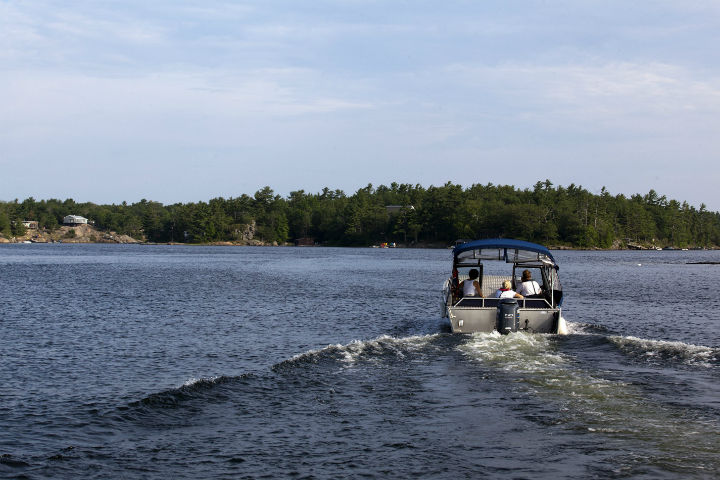A group of concerned property owners in Meaford, Ont., are speaking out against a proposed energy storage facility that would use water from Georgian Bay.

TC Energy has proposed to construct and operate a grid-scale energy storage project for Ontario’s electricity system that would cost $3.3 billion. The facility by Georgian Bay would connect to a transformer station near Barrie through a transmission line, according to John Mikkelsen, the business development director of the proposed project.
“Our group has studied this research. We’re extremely concerned about the prospective pollution that could be caused, the impact on the environment,” Tom Buck, a founding member of the Save Georgian Bay group, told Global News.
“The operation is right next to many residents.”
Buck said his group is worried about the number of fish that could die as a result of the operation, which is “similar in functionality” to the Ludington Pumped Storage Plant in Michigan, according to TC Energy’s website.
“The plant in Ludington, Michigan, was approved for construction in the 1960s,” said Bruce Rodgers, an environmental consultant and member of the Save Georgian Bay group. “When it first started operating, it killed 150 million fish per year.”
After a 12-year legal battle, a mitigation strategy was developed for the Ludington plant, although it’s only 85 per cent effective, according to Rodgers.
Jennifer Link, a TC Energy spokesperson, said the proposed project is similar in functionality to the Ludington plant in that it uses water to store energy.
“When we’re developing this project, we’ll be looking at using modern-day equipment, state of the art design,” she said.
To protect the fish population, Mikkelsen said extensive studies will need to be undertaken.
“They’ll start by defining what is there today, designing the facility in a manner that avoids anything that’s there today, and that would mean both fish populations and fish habitat, spawning habitats,” he said.
“The facility would be designed to mitigate any potential harm to fish to the best of our ability.”
Buck and Rodgers said they’re also concerned about a change in Georgian Bay’s water quality, specifically the potential for turbidity – a loss of transparency in the liquid.
“Right now, the bay is considered very pristine,” Buck said. “The water is very clear, so when they start digging for this enormous structure into the water… it’s going to stir it up.”
Mikkelsen said turbidity is an issue of design, which has to do with velocities of water and the materials that are there.
“The potential to create turbidity will be examined as part of the environmental assessment process and model, so that we will design the facility so that we won’t create turbidity issues that are a concern,” he said.

Aside from the storage facility itself, a transmission line will be constructed to connect the site to the electrical grid, but according to Link, it’s unclear yet whether that will be constructed above or below ground.
Link said if TC Energy does use overhead transmission, it would try to minimize its footprint by following existing corridors.
“While there might be new overhead infrastructure, we’d be looking to install it in places where the infrastructure already exists,” she added.
The proposed project would be developed on property owned by Canada’s Department of National Defence (DND).
“DND agreed to provide TC Energy with a one-year access agreement to complete its studies.”
According to Poulin, the access agreement doesn’t mean the project has been approved.
“If TC Energy decides to proceed with its proposed project after it has conducted its feasibility studies, it would be subject to further government review and approvals in consultation with the Meaford community, Indigenous groups, and other interested parties,” Poulin said.
“Before considering TC Energy’s project, we will conduct our own reviews to be certain that it would not affect current or future military training and operations.”
Shirley Keaveney, Meaford’s deputy mayor, said she shares the public’s concerns.
“Our council is neither for nor against this project publicly until we have more information from TC Energy,” she said. “It’s really imperative that our public know that we share those concerns.”
According to Keaveney, the project is outside the municipality’s jurisdiction.
“Our council doesn’t have the opportunity to vote on this project,” she said. “The approval levels all come from the federal levels of government.”
Mikkelsen said the proposed project doesn’t produce any emissions.
“When you build this facility and tie it to the Ontario electricity system, it improves the overall efficiency of the Ontario system and improves the environmental footprint of the system,” he added.
Link said TC Energy is still in the early days of the project and is trying to see whether it’s feasible to develop the facility at the proposed location.
The energy company will host an open house in Meaford on Dec. 11 so residents can learn about the proposed project.
“I think if they can guarantee that there would be zero impact on the fishery, zero impact on the animal habitats, zero impact on the neighbouring community in an adverse way, then that is worth looking at,” Buck said.





Comments